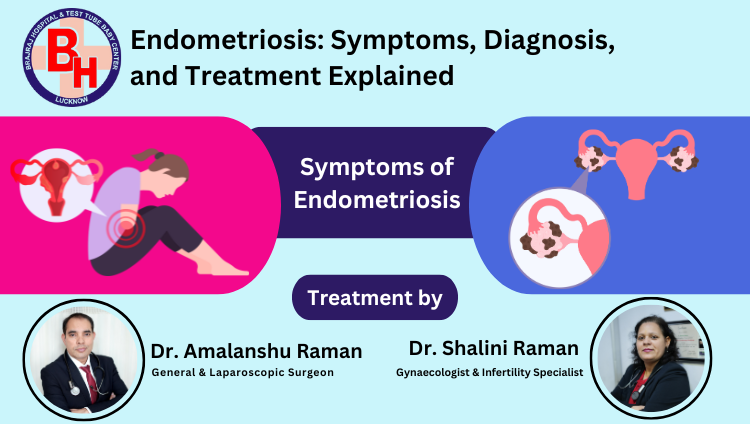24*7 Availibility
Monday to Sunday
Tahseenganj Crossing Hardoi Road Chowk, Lucknow
U.P. India
Monday to Sunday
U.P. India

Endometriosis is a common yet underdiagnosed condition that affects countless women worldwide. Despite its prevalence, it remains shrouded in misconceptions, leading many women to endure unnecessary pain and complications. This blog will cover the symptoms, diagnostic methods, and treatment options for endometriosis, empowering women with knowledge to manage their health better.
Endometriosis occurs when tissue resembling the uterine lining grows outside the uterus. This misplaced tissue can cause severe pain, scarring, and adhesions, often impacting nearby organs. The condition can significantly affect daily life, particularly during menstruation.
Endometriosis affects approximately 1 in 10 women of reproductive age. Despite these high numbers, many women remain unaware of the condition or its symptoms, delaying diagnosis and treatment.
A widespread misconception is that painful periods are normal, leading many women to dismiss their symptoms. Stigma and a lack of awareness further discourage them from seeking medical advice. This delay can result in worsened symptoms and prolonged suffering.
Endometriosis pain is often more intense and longer-lasting than typical cramps. If pain disrupts your daily life or requires frequent medication, consult a healthcare provider.
The diagnostic journey often begins with a pelvic exam, where a doctor assesses abnormalities in the pelvic region.
Ultrasound or MRI scans can identify cysts or abnormalities, though they may not definitively diagnose endometriosis.
Laparoscopy is the gold standard for diagnosing endometriosis. This minimally invasive surgery allows doctors to confirm the condition by directly visualizing the pelvic organs.
In severe cases, surgery may be necessary to remove endometrial tissue. Minimally invasive laparoscopic surgery is often used for this purpose, improving symptoms and fertility outcomes.
Adopting healthy habits can help manage symptoms:
Pain can be managed with heat therapy, over-the-counter pain relievers, and gentle stretches. Finding what works best for you is key.
Endometriosis can affect fertility, but many women successfully conceive with treatment. Fertility specialists can offer options like IVF or other assisted reproductive technologies.
Connecting with others through support groups or online communities can be empowering. Sharing experiences provides emotional support and practical advice for managing endometriosis.
Endometriosis is a manageable condition with the right knowledge and support. Early diagnosis and treatment are critical to preventing complications and improving quality of life.
Timely diagnosis and treatment can significantly enhance quality of life and fertility outcomes.
If you suspect endometriosis, consult a healthcare provider specializing in women’s health. Many online platforms offer guidance and community support to help women navigate this journey effectively.
Take the first step towards managing endometriosis by seeking information and advocating for your health. You deserve care and relief from the challenges of this condition.
WhatsApp us
